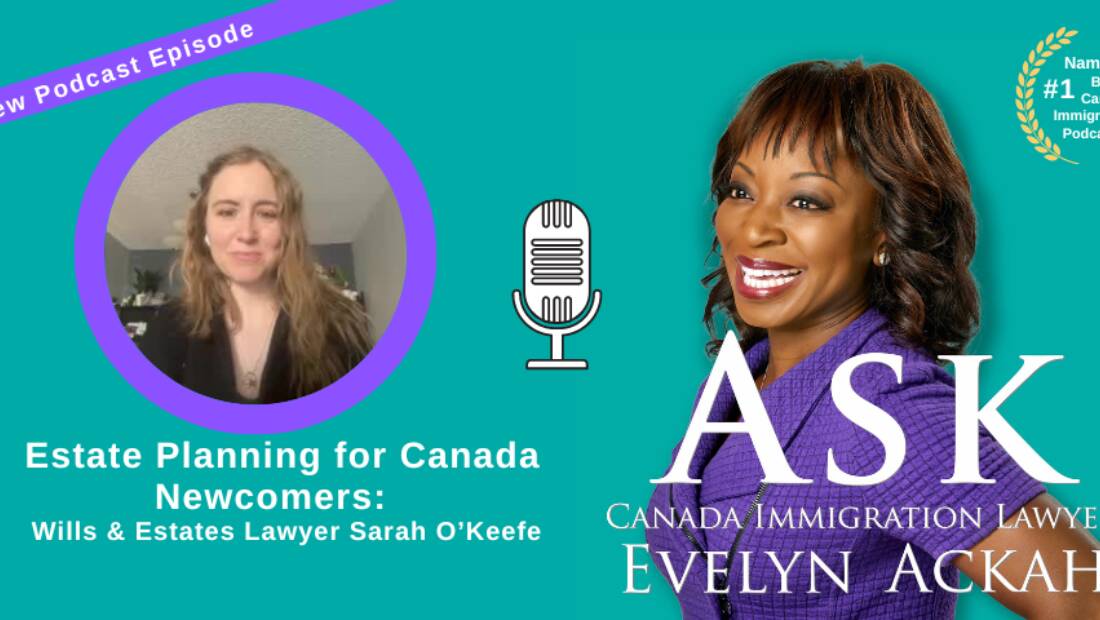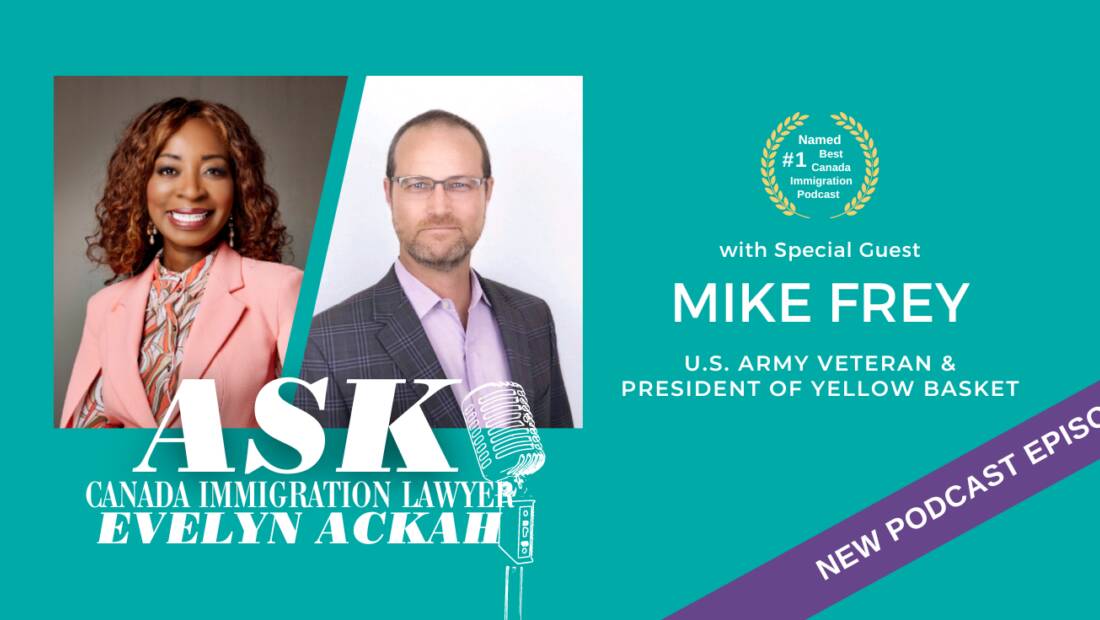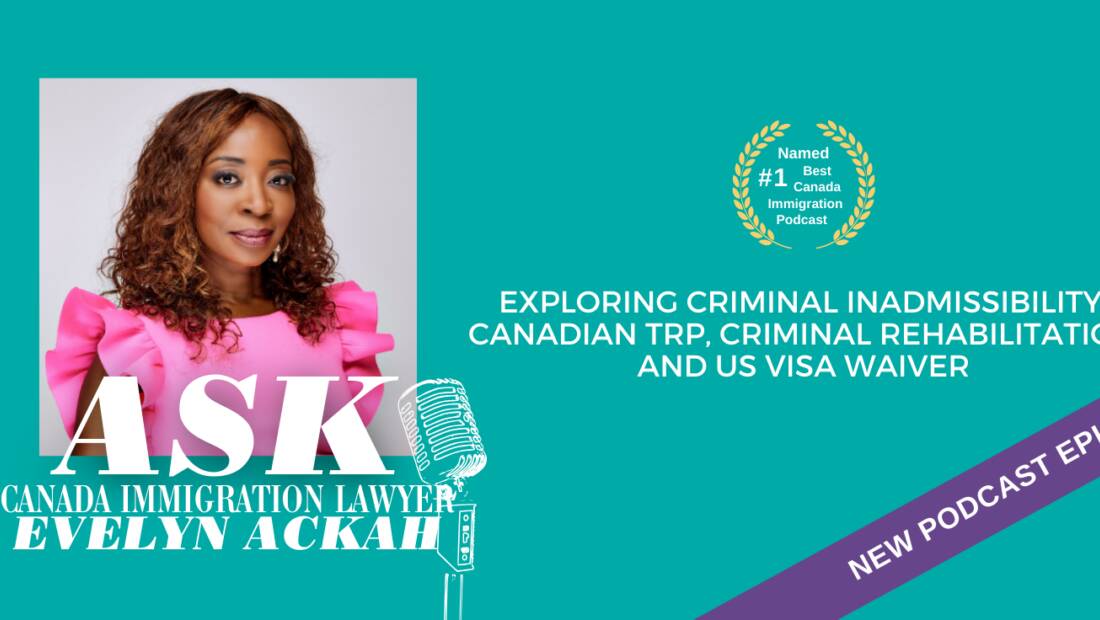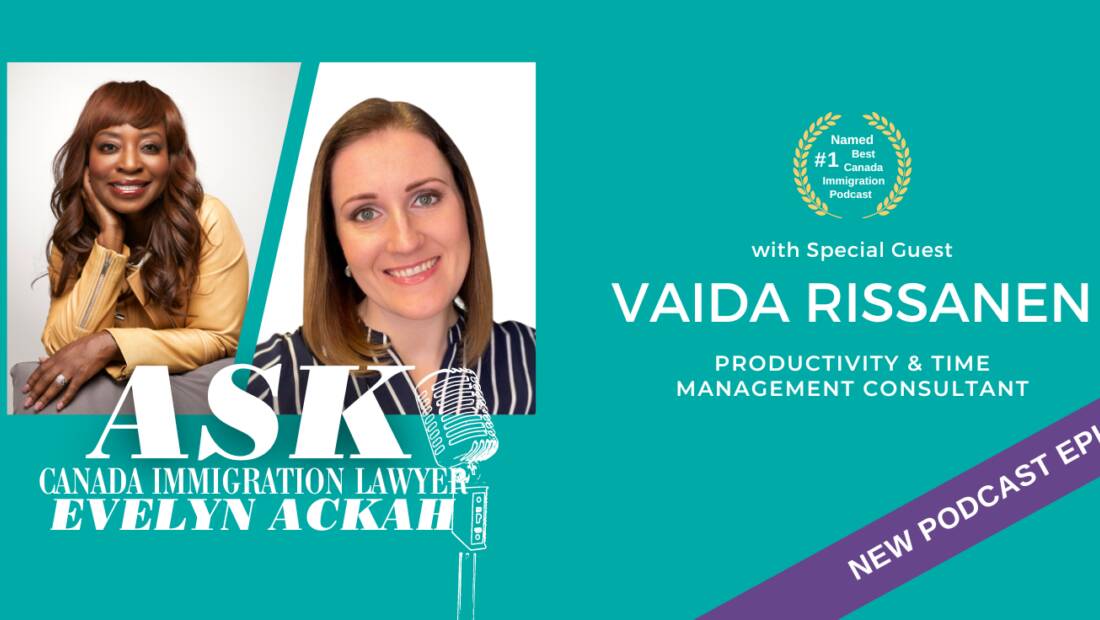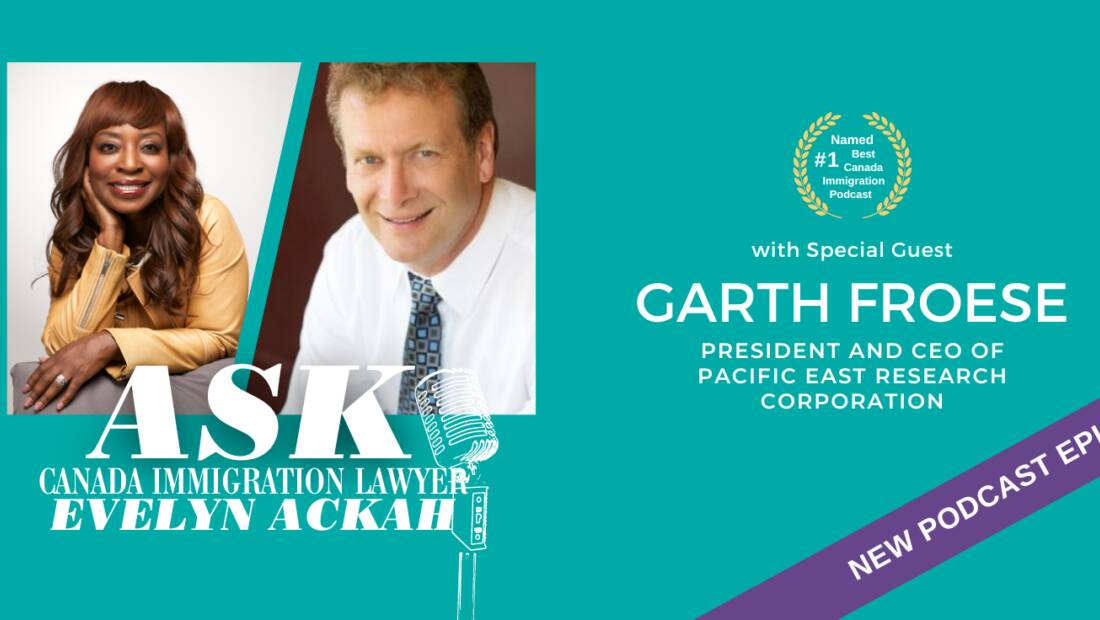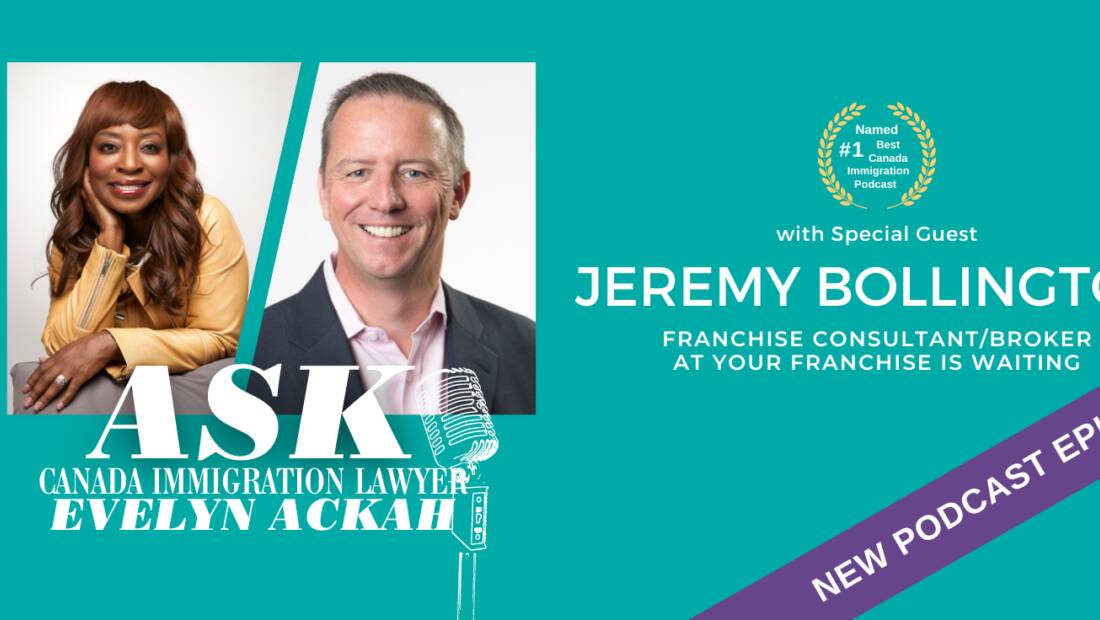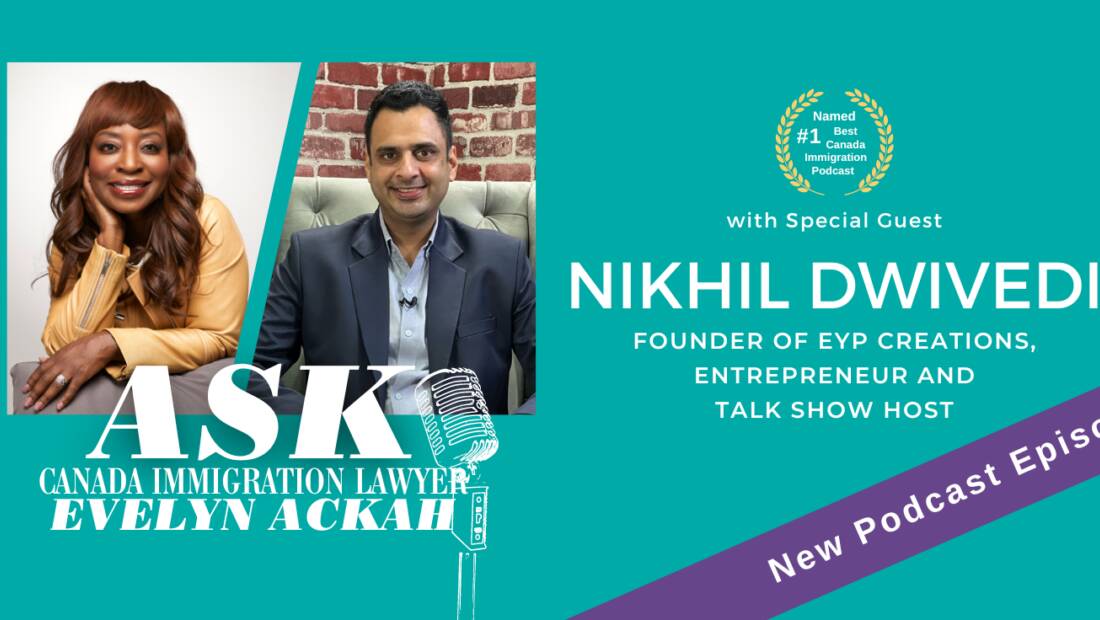Or listen on your favourite podcast app
Calgary immigration lawyer Evelyn Ackah spoke with Sarah OKeefe, a Calgary Wills and Estates Lawyer, about the importance of estate planning for newcomers to Canada. Immigrants to Canada have worked really hard to get here.
BOOK YOUR FREE CASE EVALUATION
And when they do get to Canada, their families, their assets, their investments have to be protected. If newcomers don't put the correct legal Canadian documents in place - a will, power of attorney and a healthcare directive - they can't protect their legacy, the intergenerational wealth that they've worked so hard to acquire. They or their loved ones will need to go to court to get protections, access and authorizations, which can be avoided by proactive estate planning.
Evelyn and Sarah discuss the importance of estate planning for immigrants to Canada including:
- April 16th is advanced healthcare directive day in Canada
- The importance of a healthcare directive for expats in Canada, whether they are staying for 3 years or permanently
- Why a will and other estate planning documents from their home country are not sufficient for immigrants living in Canada
- How a power of attorney and healthcare directive can prevent family stress and fighting
- Taxation of trust for minor children/children with testamentary trusts set up (jurisdiction change of trust)
- Frequency of travel, making the living documents important
- Future Probate Concerns: Executor having appropriate backups/intestate where bond is required for out of province/country family members
- Specific language re funeral arrangements. These can be incorporated into the Will ensuring compliance with culturally specific rituals
- Ensuring the preservation of 'intergenerational wealth' for the family through the utilization of trusts (guarding against creditors, matrimonial breakdown and lawsuits)

About Evelyn Ackah
Evelyn Ackah is the Founder and Managing Lawyer at Ackah Business Immigration Law. We work with individuals and business owners from all over the world who want to cross borders seamlessly. For more information on immigration to Canada or the United States, Ask Evelyn Ackah at Ackah Business Immigration Law today at (403) 452‑9515 or email Evelyn directly at contact@ackahlaw.com.
The Ask Canada Immigration Lawyer Evelyn Ackah podcast by Calgary Immigration Lawyer Evelyn Ackah was named #1 Best Canada Immigration Podcast in 2022 by Feedspot.
BOOK YOUR FREE CASE EVALUATION
Transcript
Evelyn Ackah:
Good day. This is the Ask Canada Immigration Lawyer podcast. This is Evelyn Ackah speaking. Thanks so much for joining us. I have the pleasure today of welcoming my colleague, Sarah O'Keefe, to joining us on our podcast to talk about her expertise as the wills and estates lawyer here in Canada. Welcome, Sarah.
Sarah O’Keefe:
Lovely. Thank you so much, Evelyn. It's a pleasure to be here.
Evelyn Ackah:
Well, I'm really happy to have you here because I feel like this is very informative for people who listen to our podcast. I usually talk a lot about immigration and then all of the other areas that connect to immigration and wills and estates is definitely one of them. So do you want to give us a quick overview kind of about your background and what brought you into this area of wills and estates?
Sarah O’Keefe:
Yeah, absolutely. I started out, actually, my first articling position was in a wills and estates firm. They actually practiced in corporate tax and estate planning, but that's kind of where I started. I had a genuine interest in helping people kind of put together these really heavy documents that are basically, you're planning out your life and your death. So that's kind of where I started with that and I've tried to kind of get away from it, but I keep coming back to this area because it's an area of law that everyone kind of lawyers included, we don't take it seriously.
We think it's just a will, but it's actually not. That is the bare minimum that you can do. So that's kind of why I find myself, as a lawyer, if I go somewhere else, I keep coming back to this because it's so important for everyone. Historical Canadians, new Canadians, people who aren't quite Canadian yet. They're in a permanent residency stage. But when you are here, you need to have these documents. And I'm interested in getting that word out to make sure that everyone understands that these aren't just simple documents. They're outlining your life and your passing almost.
Evelyn Ackah:
Absolutely. No, it sounds heavy in the sense of, oh my God, we're talking about when I'm not around, but there's so much more to that. So, one of the things I'd like to kind of start the conversation around is why do you think a will and more importantly, more detailed an estate's plan necessary for, obviously our listeners and our clients would be new, permanent residents, immigrants, immigrants, and people who are even here for three to five years with work permits. Why is it important?
Sarah O’Keefe:
So from what I've seen, and for me personally since I've been in this industry now working in it for five years, everyone I've come into contact with, they have spent their lives building their estates. They work hard, especially people coming to Canada. You have worked really hard to get here. Sometimes it's a struggle to get here. And then when you get here, you want to make sure that you are protected. And if you don't put these documents in place, even if the will is not in place, the power of attorney and the healthcare directive, they function on your life.
So if you come into Canada on day one, if something happens to you, which accidents happen, if you get into a car accident and you are incapacitated in a coma, you are basically having to either force your family members to get a court application to be able to take care of you, or you're almost having to let the cards fall where they may. So planning is important because why are we, as people working so hard to build these estates for ourselves, for our children, these intergenerational wealth and legacy that we've created? Why do it if you're not going to protect it?
Evelyn Ackah:
Absolutely. No, that's very powerful. I think you're totally right. We all have stories of people who've come to Canada. I have one just off the top where it was so sad. It was a family that lived in Mexico that the husband was Canadian and he'd been living in Mexico with his family for 20 years and got sick and decided it was time to maybe move to Canada, came back to Canada and within a month of arriving he died. And it was just like, and then I was getting these calls from lawyers and everybody to how can you help? And I was between the immigration for the child and the wife, and then on top of it, the will, which was a Mexican will. You didn't have a Canadian will. It was, but property in Canada, in cases like that, you just think, holy cow, this is so important.
Sarah O’Keefe:
It is. And then the hardest thing, it's so easy to put it in place, but if you don't have it in place, if you need it is very, very difficult. And so your example there, having that Mexican will, it does work, but one, you have to get it translated because the Canadian courts won't look through it. And then two, you have to go through those Canadian courts again. So you're having to hire a lawyer, which they're never cheap. Then you have to go to court, which is again, never cheap. So you are almost having to backtrack, whereas why backtrack when we can just put it in place day one, put that security there.
Evelyn Ackah:
Okay. So let's talk about what exactly the basic estate planning documents are that you would recommend. So let's say I come to Canada, I'm a new worker, even from the US, and I'm here for three years on a expat assignment. What do you think I need to do first?
Sarah O’Keefe:
So if you come to Canada and you don't have any properties, but you have assets outside of that. So bank accounts, if you have Canadian bank accounts, you should have a will, right? So as soon as you have assets in another jurisdiction, in another country, have that country a will. But more importantly, if you don't, let's say you come here and you're just temporarily in the country, you're not, you're renting properties, you only have a temporary bank account, then I would say you can maybe put the will to the side, but do not forget the power of attorney, the healthcare directive.
Evelyn Ackah:
Healthcare directive.
Sarah O’Keefe:
They are paramount and one of the nastiest court applications to get, because you can go live your life without a will. And there are resolutions. There's the intestacy act that can step in to dictate how your estate's going to be divided, which that's not ideal, but there's something. But when you have a power of attorney or you don't have a power of attorney and you don't have a healthcare directive, someone has to apply to court to be granted it. That ability to step into your shoes while you're incapacitated. And then the scope of that granted power of attorney, granted healthcare directive is very, very limited.
I actually saw someone who was, because I've only said this story, but I've actually seen a power of attorney that was court granted because they didn't actually have one in place and it was so restricting that it didn't actually provide as much benefit as it would've had it been appropriately set up so that it could facilitate the actual role.
Evelyn Ackah:
Okay, interesting. So we're talking about, let's say though, somebody who comes in and buys a house, which sometimes people do, especially now, the rules keep changing. So if you have status, you can buy a house and they have a young child, what do they need?
Sarah O’Keefe:
All of them. They need all of them. They need all of them. Because just think of it, even if you didn't have the house, if you just have a child, just the child. You want to talk about guardianship, you want to talk about where the estate is going. Because again, if you don't have the will, some of it's going to your partner, if you have a partner, and then some of it's going to go to your children.
And that sounds fine, possibly, but think of it, if you have minor children and you have a wife or a partner that could take everything, you may want the partner to have it all in trust until they're passed and then go to your children. But if you leave it up to fate or the system, your minor children could have these trusts that are only in place until they're 18. If I create a trust, I can create it so that at 25 we reassess, at 30 we think about it. But if it's court applied, 18 they have it. And that could be a lot of money. And I have learned from very senior lawyers who have been in this industry, and the common expression is money makes people funny.
Evelyn Ackah:
I like that.
Sarah O’Keefe:
And that's wills and estates.
Evelyn Ackah:
I think it's true. So you're thinking that they would need a will, a power of attorney, healthcare directive and guardianship documentation.
Sarah O’Keefe:
Well, the guardianship would be in the will, right?
Evelyn Ackah:
Okay. Yeah.
Sarah O’Keefe:
So it's sorted then, you're taken care of.
Evelyn Ackah:
Okay, that's good. Oh my God. So why do you think when people come to Canada, they don't really think about this issue until it becomes a crisis? I mean, Canadians are also battle, as you say, but at least we know.
Sarah O’Keefe:
I was about to say. Yes, exactly. I'd love to say it's just new Canadians, but it's just everyone. And I genuinely believe the reason is no one wants to talk about death. When I first started this practice, I actually struggled being just talking about this. It's heavy. These are heavy topics. You're having to talk about where you're going in your life, because we're talking about estate documents. But when we start talking about an estate plan that is not just a will power of attorney healthcare directive.
A plan is when we're looking at, okay, this is where you are and this is where you want to be, A and B, and how do you get there? Then we're talking about tax strategies, investment strategies, charitable dispositions in the will to offset taxes on debt, those little tiny things, all of that. And that's why it's important.
Evelyn Ackah:
Wow. So what's the difference then, Sarah, between a testamentary versus an intestate?
Sarah O’Keefe:
So a testamentary versus an intestacy estate is essentially the difference between having a will, which is testamentary, and the intestacy is there's no will. So they're more following the legislation, which dictates how it's to be divided. But when you have a testamentary estate, that basically means that the estate is protected by the will, which is essentially the will is protected through the executor. So they become a trustee. They have a fiduciary obligation to the estate. So that is the primary difference between the two. One is essentially protected, and then one is essentially dictated by legislation, how it's to be divided.
Evelyn Ackah:
And so in terms of wills and estates, does it matter where people are living, which province they're living in? I mean, I know that you we're in Alberta and you can do work here, but I understand you can also help with people from other provinces as well. Is that right?
Sarah O’Keefe:
Absolutely. Yeah. So, every province has its own bit of legislation. So they have their own rules and requirements. For example, the healthcare directive, if you go to different provinces, they call it something different. And I actually don't know why, but they do. But regardless, they all have their own individual legislations. And more or less the wills, the power of attorney, the advanced healthcare directives with a name change, they're all quite similar, but different sections.
That being said, if I had a client who was in Alberta, but they also had property in British Columbia, for example, because British Columbia has a different kind of probate requirement, I would probably have a will for British Columbia as well as Alberta. So that's where we start thinking about, it's not just the document during lifetime. We want to look at how does that document come to life.
And when it comes to life, it's overly complicated. So that Alberta will is going to have to dictate the British Columbia assets. If it's too complicated when it comes to life, get rid of it, let's implement those other wills, those powers of attorneys so that it's simplified because what I find is money makes people funny but the reason why this area of law is so lucrative for lawyers is because this is such a heavy emotional moment for the people who are left behind.
So the simpler you can make it, the more planning that you can have then on your passing, your loved ones just have to focus on the grief. They don't need to find the will or hire a lawyer because it's all of your bank accounts are listed, all of your assets are listed. It's dictated how you're going to handle it.
Evelyn Ackah:
That's great. That's how it should be. Have you experienced when people, let's say what if you have a will in one country and then you come to Canada and you have another will, because most people might have had one in their home country but didn't create one or set up one because they listened to you and got one in Canada. So in a case like that, which will generally speaking, would be the one that dominates or trumps the other?
Sarah O’Keefe:
Well, it depends on the assets. They kind of dictate what's going on. And that's another reason why you plan, because a will can actually change jurisdiction if you don't plan it correctly. So going back to your point, if there's assets in Mexico and there's assets in Canada, then the will is going to go through the process in Mexico for those assets, and the Canadian will is going to go through for the Canadian assets. And that sounds, a lot of people might hear this and they say, look, sounds like you're trying to make work for us to pay you, but you will actually save money doing it that way because there's no dispute. There's no translation. There's less court applications. So that's how I would always handle it, because the will can change jurisdictions on its own even. Yeah.
Evelyn Ackah:
Interesting. I like that message around obviously having a will and the impact of having an estate plan, not just a will, but an estate plan, how it actually leads to saving you money down the line, and especially saving your dependence down the line because you've put all of the elements in place and you're not in court and you're not fighting and you're not going through all of that. So it's actually something that I think is about being economical because by doing it right and getting it done, you're going to save money down the line. Generational wealth will just disappear and to the tax man if you don't plan ahead, right?
Sarah O’Keefe:
Yes. And no one wants that. They get enough. That's how I feel. So even if you do that level of planning to avoid paying a bunch of taxes to the Canadian government, that's reason in of itself. But here's a good little story about how even IF you have a will, if it's not thought out of how it functions, it's not going to be good.
Because let's say you just say, look, all of my estate is going to go divided amongst my children, my personal assets divided amongst my children. I have three children. That sounds nice and simple, but what I see language like that, I'm saying, okay, which of the three children gets to pick first? Because the first person is probably going to pick the most expensive item. And as soon as that person picks the Ferrari or the piece of artwork that mom and dad loved, they're now gone. They're all going to fight about it. All three of them. Now, we're going to fight about that very expensive item or another classic is a memorable, a heartfelt item.
Evelyn Ackah:
Yeah. Sentimental. Yeah.
Sarah O’Keefe:
Sentimental. Yes. Thank you. Those are the two. So, planning, planning the language of a document is vital.
Evelyn Ackah:
Is vital. Okay. Yeah. So I know that you don't do a lot of this, but estate litigation, have you seen some common litigation disputes? Is it a lot of what you just described, like family members at the end are fighting over assets and I mean it must be devastating and break up a family over money And what's left for them?
Sarah O’Keefe:
Oh, I have seen it. I've seen families in my practice where again, the last, it's always on the last to die as well. The first to die, that just goes right. Usually it's just rolled over to the spouse. But when the last to die hits, one, usually the last to die never updates their will. So, there's will discrepancies.
Evelyn Ackah:
Oh God.
Sarah O’Keefe:
That is classic. Two, sometimes when the surviving spouse has been surviving for a few years, they could meet a new person. And that new person, especially here in Alberta, there's the Adult Interdependent Partnership Act. That's family law. So when you're doing your will, you actually have to be cognizant of family law as well. Because on your death, that does not excuse you from those obligations.
For example, spousal support, child support. And if you don't include that, we're now fighting about it in court and you're probably not going to win. Another fantastic example is just liquidity problems. So I do see, in my practice, I've seen common, I call them civilian solutions almost. It's just tricks that civilians use to either avoid probate. What they understand is probate, which is the process of going to court to finalize that will, or they're just trying to avoid hiring a lawyer at all because we don't have a good reputation.
So what happens there is they're either going to move bank accounts so that the children are on the bank account with the parent, or they're going to put the child on the house so that on passing, it doesn't go through probate. So even those two examples, that's a reason for litigation. Because I had a client, and I wasn't in the role as litigation, I wasn't their lawyer for that. I was just giving her advice on, you need to be careful because mom put her on the bank account, which is completely fine. She helps mom a lot, pays her bank bills, her phone bills, et cetera. But she had other children.
Those children weren't on that bank account. And I told the daughter that was on the bank account, I said, be very careful of this because that is not your money at all. And there's actually case law created because there's so many children thinking that on passing, that's now my money. That was what was intended. And the sort of other children are saying, no, no, no, no, you were helping mom. And it's been brought back to the estate on a resulting trust. So there's a lot of heavy, little, tiny details that people try to avoid lawyers and probate. But in the end, you're coming back to court and you're dealing with lawyers because it didn't work.
Evelyn Ackah:
And cost you so much more. I mean, we see these wills at the drugstore, people just put them together. Give me your sense of those, because I know that for lawyers, immigration lawyers, this whole concept of even like legal zoom and all this, everybody becomes an expert. In terms of people that you see purchasing those wills and what the impact is, it's not worth saving money to do it wrong.
Sarah O’Keefe:
Exactly. So let's say for example, first off, let's say you have someone who gets one of these will kits, and they've done their research and I've met those people. They're very smart. You don't need a law degree to digest information. And they're really on it. They know what they're talking about, but they aren't aware, again, of how the document comes into life. They can say, yes, I want Johnny, my son to be my executor. I want all three children to be splitting the residue. I want some so and so going to my grandchildren, they can list it all out. But if they're not thinking about how the document comes into being, it could still not work out the way that they intended to essentially.
Evelyn Ackah:
And then it's all for nothing. I mean, I'm sure there's lots been litigation around these will kits. For everything from was their knowledge, you didn't get legal advice. Did you know what you were signing when you gave this to that person. Or money going to a charity and not the kids. I've seen some of those interesting cases where kids and those left behind are fighting because the person who passed made a decision to donate everything to the dog store down the line or the kennel or whatever. It's crazy. Or the charity.
Sarah O’Keefe:
It is. It is absolutely. And honestly, with every time, like lawyers, we have to go to do continuing education courses. So every year I'm registered in wills and estates in Alberta and in Newfoundland, in British Columbia. And that is one of the common, and I'm not saying in a bad way, but it's one of the things lawyers are really excited to see. What is this going to become? Because these will kits, they are a bit of a joke.
It's Almost like when you have, to me, it's like you have a gaping wound and you put a bandage on it and you're like, that's good. The gaping wound is going to fester. You're probably going to lose a lamb in the end of it all. It's not going to go well for you. But if you think of it, Evelyn, it's not just the will kits that I want to talk about either. Sometimes you have law firms, and this is again something we've talked about in these seminars throughout the provinces, but you have lawyers that like to dabble in this area. It's one of their favorite things to do is do this on the side.
And I'm sure people know of it. You go reach out to the lawyer, they give you a flat rate fee, and they send you this attachment that says, okay, list all of your information and what you want in your will. And then the lawyer drafts it and then you sign it and off you go into the goodnight. And that's it. That is usually just as well, you did nothing more than often not.
Evelyn Ackah:
That's the minimum.
Sarah O’Keefe:
Exactly. Because if we're not talking about, who are you naming as an executor. Who are you naming as the power of attorney. Are they the same people? Can you show me the real property report so that I can see the title on it. Because if it actually isn't held the way that you're telling me it's held, which usually it isn't, right? Because who knows that when they buy a house 25 years ago, if it's not like that, the will again is not going to function the way it should.
Evelyn Ackah:
Unbelievable. Unbelievable. This is very much like, oh my God, everybody should have one when they arrive. The thing that I'm really interested in is the peace on guardianship. And our attorney, and I know that I guess April 16th is advanced healthcare directive day in Canada. So can you talk to me a little bit about what is an advanced healthcare directive.
Sarah O’Keefe:
Yeah, yeah, absolutely. So the advanced healthcare directive is basically the other side of the coin of a power of attorney. They basically, these two documents step in during your lifetime while you are incapacitated. So you are in a car accident, you're in a coma. The power of attorney takes care of your finances. And the advanced healthcare directive, the health directive takes care of your healthcare matters.
And these two documents, even although they function together, they can have different languages. And the legislation that backs these documents gives you protection. I always tell people when I'm looking at them, they scare people. These are the two scariest documents because they lift out all of the powers that you are giving to someone else while you are still alive. You have to really understand the powers that you're giving to these people.
So the healthcare directive, if I named my spouse, I get into a coma. My spouse can pull the plug whenever they want, as long as it's the language that's provided in there. But they're the ones who are, he's going to dictate where I'm staying, who I associate with, what programs I register in. So they are very, very restricting documents.
And I actually saw, and I apologize if this is not the focus of the health directive, but I did see one time I had an emergency, someone did an emergency power of attorney, advanced healthcare directive. And when the other son came back to us to review them, because we were the original drafters and he just wanted us to look at them, I reviewed the power of attorney and the healthcare directive and the healthcare directive was as normal. It was very much, take care of this person, have their best interests at heart. If the focus is money versus health, health is always paramount. These are the requirements of what I want done my donation wise.
And then the power of attorney actually had very, very different language. It didn't have the fiduciary duty requirement in there. So you could almost do whatever you wanted with that estate. So another thing that you see traditional powers of attorney and healthcare directives, because they work together. Usually if a healthcare directive is enacted, the power of attorneys also enacted.
Evelyn Ackah:
Yes. You think so.
Sarah O’Keefe:
Right? You'd think so normally. The power of attorney would normally have language that says if these two people, because they can be two people, and these two different roles have a disagreement. So let's say mom's in coma, daughter says, mom needs to go to a care home. Son says that care home's very expensive. Let's go to a little less expensive one. If they disagree, the daughter wins because the health is paramount. That is primary. But you can see directives, powers of attorneys where the appropriate language that protects the health over the finance is not there. They're very important.
And like I said, the scariest part about the health directive and the power of attorney is that at least with a will, you're dead. I guess. For me, the children are fighting, I'm just going to roll in my grave. But you can come out of a coma and a lot of people do. And there is case law that talks about how, and I've had them, I've been a part of them where they appointed a niece, and that niece actually during that incapacity wiped the entire estate out financially. And that individual, that example I provided is a real person I met last year, and she's now had to hire a lawyer to go sue the niece to hopefully get back what was stolen.
Evelyn Ackah:
Unbelievable.
Sarah O’Keefe:
But that's what these documents can do.
Evelyn Ackah:
Yeah, no, I know. You think for me is even as a parent. So when I became a parent, immediately was getting the guardianship, and then at some point then I got married because my kids were adopted. And then it became, oh, we got to change this again because there were other people that were guardians. And so I think of wills and estates and all these documents that are connected, they're living in the sense that you have to update them. You get married, you get divorced, you buy a house. There are times when they need to be updated, right? How frequently would you say something like that or just when there's a significant change in your life?
Sarah O’Keefe:
So usually it's the latter. When there's a significant change, you purchase or you sell a house, an asset, you gain a child. Even if there is a loss in the family, sometimes an executor passed who you had named. But to be safe, because sometimes when I say big events, a big event is very, very relative. It's subjective to the person. So I've abandoned that logic. I say, every five years, pull out your death documents, your incapacity documents, and just sit down and go through it. It sounds daunting, but you will save time, money, stress, and aggravation. The other thing I really recommend, and this is something that I find is always lost on firms that aren't focused in this area, is that the documents are very hush hush. They have a will, they have a power attorney, they have the advanced healthcare directive, and nobody knows about them.
Evelyn Ackah:
Yeah.
Sarah O’Keefe:
Nobody knows they're appointed. Nobody knows their roles. They haven't seen the advanced healthcare directives. And in Alberta, the people you name don't have to accept the appointment, right? So there's nothing that they don't have to sign anything. Whereas in British Columbia and Newfoundland, they at least have to sign saying, yes, I'm consenting to this role, but if you don't even give them the knowledge. So I tell people, and I have found only success with this family meetings are vital. Have the conversation about what your documents look like. You don't need to tell your children or whoever the beneficiaries are, your net worth. We don't want anyone sleeping with one eye open for the rest of their lives, which is how people feel. But you need to say, okay, if you put in trust for your children, explain what a trust is because I put them in place to protect the children.
But if we don't talk about it, the children look at it and they immediately think, mom and dad didn't trust me. Why is myself not in trust? And usually it has nothing to do with the child. But we're talking about a trust protects against matrimonial breakdowns of the children, of yourself, of spouses, even. It can protect against creditors, it can protect against the government if you kind of get into any kind of bankruptcy issues. It is very, very, it's a useful strategy for estate planning, but something that is so useful is always interpreted and I don't know why as mistrust.
Evelyn Ackah:
That's so interesting. I've never heard that before. Well, this has been so interesting, Sarah. I really appreciate it. I mean, obviously you're a wealth of knowledge and we're looking forward to being able to collaborate and help our immigration clients really make sure that as a part of their post arrival supports, they consider wills. And so as you know, we're going to be writing about it and you're going to be writing about it and talking about it and sharing this information. Because I really feel like just like getting a driver's license and you buy a house and a sim card, everything, you need to think about changing your wills when you come to another country.
Sarah O’Keefe:
Absolutely. I wish they could put it in place so that you almost everybody had to be forced to do it, like your driver's license. Because that would make my job easier, but again, the estate litigators wouldn't like it though.
Evelyn Ackah:
What about things, just as we wrap up, what about things like saying organ donation? You put that in your... because a lot of times people don't know unless you tell your family. Is that something you would also put in your directive?
Sarah O’Keefe:
Absolutely. Yeah. This is where that advanced healthcare directive is where we're talking about if you want to do organ donation during your incapacity, so this is an interesting one as well. So I apologize if it's not quite answering your question, but if you say, let's say you are in a coma or I'm in a coma. Let's make it nice and easy. I'm in a coma and my niece needs a bone marrow transplant. Now if I just have nothing in place and I'm a match with my niece, I'm in a coma, there's nothing I can do about it. Right? Nothing. If I'm in a coma and my advanced healthcare document directive has language that says, look, I'm okay to donate to my immediate family or my extended family, as long as it doesn't impact my life, then that would actually facilitate me being able to donate something that I would normally donate anyways to my niece, a bone marrow.
But it lets you do things like that. So that advanced healthcare directive, that's where we're going to get into what do you want? How alive do you want to be forever? Yeah. A lot of people are focusing on a quality of life, not necessarily a quantity, but everyone is subjective. If you have religious rights and matters, this is where we can put language in there that says, you know what you are okay with doing in the hospital setting and what you're not okay with. And actually I'll tie that into the will because I do find that when I have helped Canadians or new Canadians in this area, a thing that gets missed is that if you have specific kind of rituals or religious aspects that you want to have abided, then that's something that we would put in the will as well.
So I always think that's important. And the more you know, the more you can put in a document, that's what these are doing, the advanced healthcare directive, power of attorney, the will, it's giving all details so that the person that you are pointing doesn't have to guess.
Evelyn Ackah:
I know. That would be such a great, that's a gift, I think, too, because it tells people what you wanted. You're not making decisions, not knowing, especially even the ceremony or the funeral rights or however, you know what you want. And I think that's really great. So I really hope that this has been useful for people because it's been very informative for me, Sarah, and I really, really appreciate you joining us on the Ask Canada Immigration Lawyer podcast. And people need to know if they'd like to learn more about your services, they can contact us at Ackah Business Immigration Law. We'll be happy to connect you with Sarah, and she can talk to you about whether or not she can assist you with putting together a wills and estates package if you're here in BC, Alberta, BC, or Newfoundland, right? Or even across the country.
Sarah O’Keefe:
Exactly. The law society has a hundred hours. So again, it's just legislation. So to me, we can help every Canadian, new Canadian, historical Canadian, all of them. You need these documents.
Evelyn Ackah:
We do. Thank you so much for joining us. It's been such a pleasure.
Sarah O’Keefe:
Absolutely cheers.
Evelyn Ackah:
Thanks so much. Cheers for joining us on the Ask Canada Immigration Lawyer podcast. I hope that you'll share this podcast with your friends and family. Please sign up and please do give us a five star Google review so more people can find us on all the platforms where you find podcast. Take care everyone. Till next time, bye-bye.

